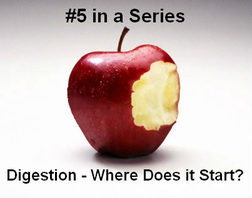
So where does it start, and what can we do to assure that what we eat will be absorbed into the body?
It all starts with your brain and your sense of smell. Think about your favorite food right now, prepared just the way you like it. Think about how it smells and imagine taking a bite of it right now. Doesn't that send a wake-up call to your salivary glands? Your body is gearing up for the arrival of this food. Enzymes are released in the mouth stomach to start the chemical break-down.
The enzymes that are released from the salivary glands are enzymes (amylase) designed to break down starches (carbohydrates) and enzymes(lingual liapase) designed to break down fats. While carbohydrates and fats begin their digestion in the mouth, protein does not begin to digest until it reaches the stomach. In the mouth is the first chance for carbohydrate digestion, and the only chance until the food reaches the small intestine. Next time you eat some carbohydrates, try to chew your food until it is nothing but mush, and you will see that the breakdown is taking place in your mouth, since the food will taste sweeter the more you chew.
Not only is there a chemical break-down taking place, but a mechanical break-down of food begins with our teeth and tongue to grind the food down into smaller pieces and it works hand in hand with the chemical break-down. I think there are a lot of people who scarf their food down so fast that they do not give enough time for chemical and mechanical break-down to take place, which puts an increased burden on the stomach to break food down and reduce it to a liquid. The food will have to stay longer in the stomach because it was not chewed well, and this can produce fermentation, which causes gas and bloating. This slows down the digestive process. It would benefit us all to make a conscious effort to think about our food when we eat and take care to properly chew our food, allowing amylase (the digestive enzyme secreted from saliva glands) to work on the carbohydrates, in the mouth and in the top part of the stomach. The amylase is destroyed as the food gets lower into the stomach because of the hydrochloric acid. Remember, carbohydrate break-down will not happen again until the food reaches the small intestine.
In the mouth, saliva is a necessary factor in taste sensation, because some food components must first be dissolved before they can be detected by taste buds. We are missing the joy of really tasting the goodness of our foods when we eat with haste. Saliva consists of water, mucus, digestive enzymes, and antibacterial agents and is needed to moisten our food to aid in swallowing.
Good health requires good digestion. Without good digestion, it is very difficult to maintain good health. Poor digestion brings on symptoms, and symptoms turn in to disease states. Digestion is not optimum unless food can be broken down into the smallest available particles and then absorbed mostly in the small intestine. Work with your body to break down nutrients, first by taking the time to chew your foods.
I have been trying to work on this myself. Sometimes I can really focus and chew each bite, and then there are other times that I forget about it totally and realize that I just ate my food in haste. It takes practice, but I believe that this is one giant step we can take in enhancing our health.
For other posts in this series please see About Nutrition
Credits: Hawthorn University NC-3 Lecture "In the Mouth"
Nutritional Sciences, 3rd Edition, McGuire and Beerman

